- Home
- Lou Cameron
Stringer Page 9
Stringer Read online
Page 9
“I know. That’s why you’re not in jail. But don’t you go leaving the county just yet. The coroner may want a word with you about that gent Buck Brown shot, too, if we can only find the silly son of a bitch.”
Stringer hesitated, knowing he already had enough on his plate before he asked, “Has it occurred to you nobody saw fit to drag the creek above the stretch the body might have been thrown in?”
The sheriff snorted and replied, “You tell me how often a dead man swims upstream and I might just do that, son.”
“A dead man wouldn’t have to swim, if he had some help, would he, Sheriff?”
There was a thoughtful pause. Then the sheriff replied, “I don’t see it. Folk toss bodies in a handy creek because they’re too lazy to bury ‘em. We read their sign to where they forded Manzanita Creek or at least rid down one bank just below the Breakneck Rapids of the same. If they had the ambition to haul the body upstream through that brush-filled, rocky ravine they’d have had the ambition to hide him better. It wouldn’t take all that long to scoop out a hole and lay the sod back careful, you know. So that’s what I reckon they done, after they hauled him on across the creek most anywhere. Unless we get some help from coyotes I feel sure we’ve seen the last of that dead cuss. But just in case they uncover him, we’ll need you to back young Buck’s tale. That barkeep you say witnessed the event don’t seem willing to give us her true age.”
Stringer swore softly and asked just how long they expected him to stick around. The sheriff said until they got some sensible answers or the county gossips found something better to pester him about. Stringer swore some more, hung up, and rode on back to the M Bar K.
Old Verdugo insisted on tending to his mount, so he took the two throw-ropes, plain and fancy, to the bunkhouse to give to Pronto. But the only one there was the older Hank, who was hanging from the overhead bar again. He told Stringer, “They all et and rid out with your uncle to scout a trespasser one of the boys spotted on a rise overlooking the Thistledraw. They’ll no doubt want to tally the cows we got grazing over that way as well. But he could have been just a fool mirero admiring our beef, platonic.”
As Stringer placed the ropes on Pronto’s bunk Hank went on, “You’re an educateful gent, MacKail. So tell me if you think I could have a rupturated disc in my infernal spine. I know the Mexicans say a spread only needs one cowboy for every thousand cows. But Mexicans are used to dying young and my back just won’t snap back in shape like it used to.”
Stringer said, “I’m not a sawbones. Why don’t you see one about your back, Hank?”
“Hell, I need this job more than your uncle or any other stockman needs a crippled-up rider. I’m still good for half a day in the saddle. It’s just that once I dismount to eat or even take a leak it hurts like hell to get back on again.”
Stringer suggested he just hang in there and went on to the main house. Crazyauntida caught him in the hall, marched him into her kitchen, and demanded to know where he’d been all this time.
He said, “Just hanging out with the boys in the bunkhouse, Aunt Ida. I ate over to the Montez spread before that, so if you don’t mind, I’d like to do some writing in my room while it’s still fresh in my head.”
She told him peach cobbler wouldn’t hurt a growing boy and made him sit at her kitchen table as she bustled some out for him. She said, “You’re not going anywhere till we get some flesh on your poor bones, Stuart MacKail. Here, let me pour some fresh cream over that cobbler. Will you have coffee with it or shall I make you some nice hot chocolate? It’s no bother, either way.”
He pleaded for coffee, lest she rot his teeth entire with her ideas on proper sweetening. The peach cobbler was way too sweet, even with cream over it. As he dug in she demanded to know what sort of food he’d been eating with Mexicans, adding with uncanny accuracy that she bet it was mighty skimpy. He told her they’d served him steak and eggs. She sniffed and said it would be no trouble to scramble him some more eggs to go with his second helping of dessert.
He was fighting off a third helping when Uncle Don grumped in, sat down, and said, “It was likely only a mirero after all.”
His wife gasped and sobbed, “Oh, Lord, what could the spook be after? We’ll all be murdered in our beds and I was planning on making buckwheat and currant flapjacks for breakfast, too!”
Uncle Don said, “Now, Ida, you know mireros never hurt nobody.”
“Then what are they doing up there on the skyline, setting still and spooky for hours and never waving back when one waves at ‘em?”
Uncle Don said, “Watching. That’s what ‘mirero’ means. They just seem to go with Spanish-speaking neighbors. Not even said neighbors know why. Some say they could be just drunken vaqueros, trying to figure out where they are and how they got there. Some say los mireros are some sort of secret society and it’s a secret what they’re watching for. Some more superstitious old-timers share your suspicions they could be spooks. It’s a fact of nature that by the time you can get close enough to a mirero to ask him what in thunder he’s watching for, he’s always gone.
But I’ve been seeing ‘em now and again in these hills since I was knee-high to a grasshopper and I’ve never heard of ‘em harming man nor beast yet. Ain’t that right, laddy buck?”
Stringer had spotted his first mirero on the ridge above the schoolyard when he’d been eight or nine. Only the Anglo kids and Miss Bish, the teacher, had found the distant mounted figure at all disturbing. A kid called Pico had given a name to the mystery and, sure enough, after a time the mirero had vanished just as Pico had said it would. But Stringer asked his uncle, “How do you know it was just a mirero?”
The older man replied, “Because none of our cows are missing and the hand who first spotted him descripted him as one. He saw a gent with a big black sombrero, dressed in a black charro outfit, sitting a black horse up there on the skyline. When the hand waved at the cuss he just went on watching, still as a cigar-store Indian. That’s when the hand rid in to get the rest of us. Time we got there, the watcher was gone. That’s the way they always act. Did you have someone more sinister in mind, laddy buck?”
Stringer said, “I did. Two gents dressed more Anglo in faded denim and black wool hats with floppy brims.”
Uncle Don nodded and said, “Pronto told us about them saddle tramps you saved the Montez girl from. They’ll be long gone by this time and I don’t see any mystery to what they was after.”
Crazyauntida blushed and said, “Donald, not at the table!”
Uncle Don shrugged and said, “I never said Dotty Montez was wild. For all I know she ain’t. You know how old biddies talk about any gal younger and prettier who ain’t spoken for by the time she fills out enough to matter.”
He dug into the cobbler his wife set before him as Stringer said, “Young Tomas Montez read sign saying two men in our kind of boots were prowling about the Montez spread by dead of night. I don’t read that as saddle tramps getting fresh with a señorita they just met in passing.”
His uncle looked up with a frown and said, “Neither do I. If it ain’t true love it has to be something else. But what in thunder could that poor Maria Montez have on her spread worth stealing, save for her pretty daughter?”
He washed some cobbler down with coffee, thinking about it, and added, “Nope, it just won’t wash. It occurred to me the ones you saw chasing the poor gal might have been out to kidnap her instead of…you know. But it would make as much sense to steal the Montez goats direct as it would be to swap a kidnapped gal for ‘em. Poor Maria Montez ain’t got anything more valuable to ransom one of her kids with.”
“What about their land and water rights, Uncle Don?”
“Bank owns ‘em. I know because I had a word about it with old Banker Norris. He says he won’t foreclose without telling me first. So far they’ve been able to scrape up the payments and—that reminds me, laddy buck, you know them better than me. Last time I tried to give old Maria a lame yearling I had no better use for she cl
ouded up and rained all over me. Do you reckon they might not act so proud if you was to run a head of beef their way afore you go back to Frisco?”
Stringer nodded soberly and said, “I can try. That reminds me of another generous act you might consider, Uncle Don. You know old Hank, the one with the bad back?”
His uncle said, flatly, “Forget it. I run a cattle spread, not a shelter for lazy shirkers.”
“He says he’s in a bad way, Uncle Don.”
“I’m sure he does. I been riding many a year with a game leg. Trick knees, bum backs, and saddle sores too delicate to describe in front of your Aunt Ida go with the honest trade of working cows, laddy buck. If a man ain’t man enough to be a cowboy he ought to be man enough to look for some other line of work.”
“Hank says he knows no other trade, Uncle Don.”
“You mean no other line he wants to work at,” snapped the crusty old stockman, adding, “A top hand gets forty a month and all he can eat. Provided he spends more time on his pony than in his bunk. I don’t have anyone on this spread I don’t pay at least a dollar a day, because if they ain’t worth that they ain’t worth their keep. If Hank don’t want to pull his weight he can just go get a job swamping saloons. Like the Indian chief said, I has spoken, and Hank better not mention his poor aching back to you again.”
“What about old Gimp Verdugo, Uncle Don?”
His uncle frowned at him and said, “That’s different. Verdugo got that gimp riding for your grandfather as a top hand with more courage than common sense. That’s why he’s still worth top-hand wages. Gimp got rolled blocking a rogue steer that happened to catch your grandfather off his mount with his back turned.”
He swallowed some coffee, grimaced as if it had been bile, and said, “Old Gramp Garcia deserves some Christian thoughts, too. In his day he was a hell of a vaquero and it ain’t his fault he got old and crazy, natural. But don’t never ask me to help out a lazy sissy. For I just won’t do it.”
Stringer said he wouldn’t, excused himself from the table, and went to his room to break out paper and pencil. He reclined on the bed with the pad braced against one knee and wrote his feature for Sam Barca, shorthand. He tore up more than one sheet, trying to keep it from reading like such a potboiler. But that was what any tale of Joaquin Murrieta turned out to be at this late date.
Nor did a seemingly pointless shoot-out in a glorified ‘dobe barn add any luster to the glory of the long-dead Murrieta. Sam Barca would just blue pencil it or, worse yet, run it, and cause needless trouble for young Buck Brown. As far back as the late James Butler Hickock, gents with reps as gunslicks had been shot for no sensible reason by idiots who read too much about ‘em in the papers.
When he’d finished his dumb rehash of the Murrieta legend it was still too early for a man stuck with nothing to do but wait until the sheriff figured something out or Crazyauntida cooked supper. He still hadn’t recovered from the effects of peach cobbler on top of beer on top of Mexican cooking, so he got up, put his gun and hat back on, and slipped out a side door.
He found old Verdugo in the stable and asked his advice on more riding. The once proud vaquero told him his hired mount was jaded and suggested a palomino mare who hadn’t been ridden all day. As Verdugo saddled her for him, Stringer said, “I’d like to thank you for saving my grandfather’s life that time.”
Old Gimp looked meaner than ever, tried to hide the twinkle in his eye, and said, “Por nada. He was muy hombre. Watch this mare until she’s loped, some. Her name is Sidewinder for a good reason. She won’t buck once she’s been run. So run her good at first and if she tries to bite your toes give her a good kick in the muzzle. She ain’t as delicate as most palominos.”
Stringer thanked him for the advice, mounted up, and they were off and running. Verudgo hadn’t warned him about the way she’d try to scrape his knee off passing through the gate, but every rider worth his salt knew that old chestnut, so it didn’t work.
He rode first for Manzanita Creek, reined in not far above the stretch he and the boys had dragged earlier, and followed the bank east, scouting for the sign the sheriff had mentioned. He found the place where a pair of horses had slid down the bank and dismounted to study the sign closer. It didn’t tell him all that much. It was easy to see where they’d ridden into the water, but there was no sign on the far bank indicating where they might have come out. He turned to Sidewinder and told her, “If I was riding with another gent and we were packing a dead weight between us, I might have swung upstream or I might have swung down. But how far would we have wanted to tote that cadaver and, if we dropped it downstream, how come it wasn’t there?”
As he started to remount he spotted a tiny black figure up on a distant ridge. He stayed put, with the palomino between him and the mirero, if that was what was watching him. He could just make out the other rider’s big black sombrero. He tried a wave of his own hat. To his mild surprise the distant watcher waved back, casually, and dropped out of sight down the far slope.
Stringer muttered, “Some kids, these days, have no respect for tradition. Let’s go, Sidewinder. I know the streamside offers rough riding from here east, but they tell me you’re a tough nag.”
She was. She busted brush just fine and her steel-shod hooves hardly slipped worth mention on even the wetter rock they had to negotiate getting above Breakneck Rapids. He kept a sharp eye out for bodies hung up anywhere in the shallow muddy water to his left. It got harder to see as they climbed higher, partly because of the heavy shade of oaks holding hands above the creek and partly because the infernal sun seemed to be setting.
He muttered, “It’s later than I thought, Sidewinder. But let’s keep pushing at least as far as that hydraulic layout near the headwaters. It hardly seems likely anyone mysterious would have toted a body any further upstream than those placer swishers.”
They worked their way above a low waterfall, now running the color and thickness of mud soup. Then the lay of the land opened out and a big hunter’s moon was rising pumpkin yellow in the purple eastern sky. It revealed a scene of utter ruin to anyone who preferred these hills as the Lord had made them. A big black hydraulic dredge sat floating in a muddy lake of its own creation, its big black nozzle pointed at the steep cliff it had carved four stories tall with its high-pressure spoutings. The pressure was off, now, there was no smoke rising from the boiler stack and the whole scene was so silent it was sort of eerie. They hadn’t hosed the south bank he’d been following, so he continued on to the crackerbox shed facing the rig out on the water and yelled to see if anyone was about.
Nobody was. The shack was deserted and cleaned out. He led his mount into the trees beyond and tethered her there. Then he waded out across the knee-deep water to see what the silent hydraulic rig could tell him.
It couldn’t tell him much. The boiler plates were cold. He frowned and rolled a smoke as he mused, aloud, “I should have known that gent at the general store couldn’t have been laid off at Sheep Ranch if they’re still paying widow’s pensions. This crew gutted all the color here and no doubt lit out with lots of bills unpaid. It’s cheaper to build a new rig like this than to haul it far enough to matter.”
He saw the cheapskate gut-and-gitters had gutted the rig of its more valuable suction and shaking machinery, leaving little more than the boiler, rusty steam pump, and sheet-metal hydraulic boom to sit, as the running creek repaired itself with time and patient water. He stared at the moonlit mess they’d made of the far bank and saw most of the mud still running down to stain the Stanislaus, miles away, was coming off the big mud pie they’d left at the base of their man-made bluff.
He wondered why it was there. One would think even gut-and-gitters would have panned the last of the sand, gravel, and clay they’d gone to so much trouble to bring down.
He lit his smoke and said, “They would have. So they didn’t. The bank was caved after they abandoned this site, by nature or something more ugly.”
There was plenty of cordwood left abo
ard the dredge, so he quickly cut some shavings and built a fire under the boiler. Then he waded back ashore and moved Sidewinder deeper into the trees, telling her, “If I blow my fool self up you ought to be safe out of range of the dredge. If I don’t, we’ll just see what or who might be under all that loose spoil across the creek. Hosing to grade beats digging with a shovel, even if I had a shovel, see?”
By the time he’d once more waded out to the shapeless black mass some stars were showing in the ever-darkening sky and the low moon wasn’t shedding too much-light on the subject. He struck a match to read the steam pressure gauge. The needle hadn’t moved enough to matter.
He opened the firebox door, poked the flames higher with a handy length of angle iron, and shoved more wood in. Then he shut the door, adjusted the draft, and explored the rig to see how it might work.
The float was moored across the mild current by kedge lines, fore and aft, to keep the monstrous nozzle aimed at the bank, which they hadn’t found much color in after all. It hung from a simple block and tackle between the beams of its big A-frame. Elevation of the water cannon was controlled by letting out or taking in more line. To swing left or right the operator stood astride the flexible pressure hose from the steam pump and just gripped two wrought-iron handles. The simple valve crank near the right grab-iron no doubt controlled the water pressure.
He didn’t want to bring down any more of the cut the nozzle was aimed at; he wanted to clear away the too much that was already down. So he lowered the nozzle to where it was aimed to fire flat across the surface of the placid pond, if “fire” was a proper term for what he had in mind. He’d covered some hydraulic mining in his time, but he’d never worked at such a disgusting job.
As he experimented with his aim he found himself squatting with the high-pressure hose just under his groin. It was enough to pucker a man’s rectum even if the hose didn’t burst. Had they left even a coal shovel behind he’d have settled for doing it the harder but less puckering way.

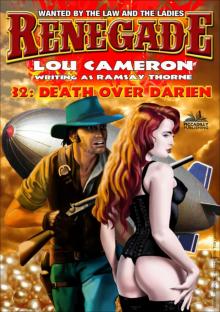 Renegade 32
Renegade 32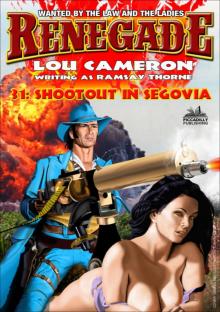 Renegade 31
Renegade 31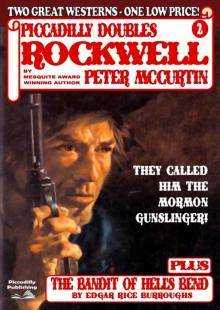 Piccadilly Doubles 2
Piccadilly Doubles 2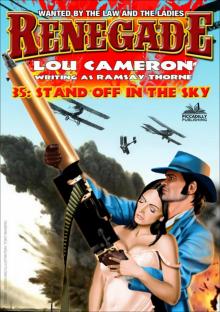 Renegade 35
Renegade 35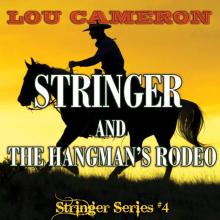 Stringer and the Hangman's Rodeo
Stringer and the Hangman's Rodeo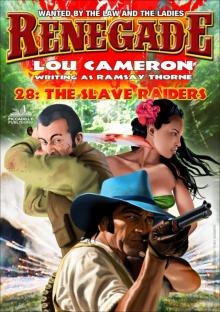 Renegade 28
Renegade 28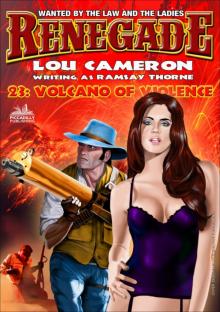 Renegade 23
Renegade 23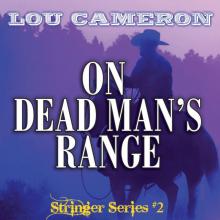 On Dead Man's Range
On Dead Man's Range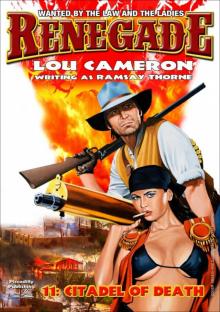 Citadel of Death (A Captain Gringo Western Book 11)
Citadel of Death (A Captain Gringo Western Book 11)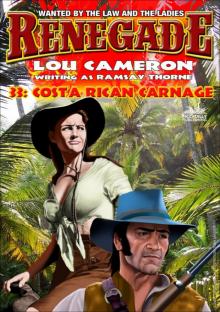 Renegade 33
Renegade 33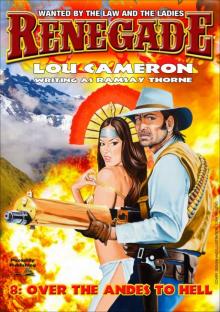 Over the Andes to Hell (A Captain Gringo Western Book 8)
Over the Andes to Hell (A Captain Gringo Western Book 8)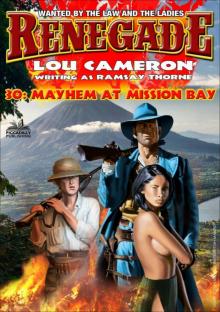 Renegade 30
Renegade 30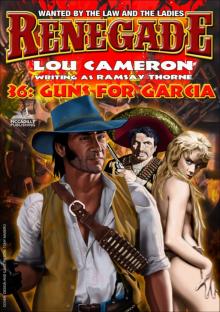 Renegade 36
Renegade 36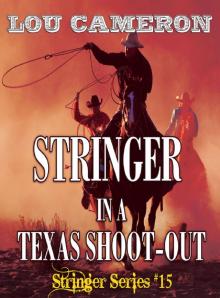 Stringer in a Texas Shoot-Out
Stringer in a Texas Shoot-Out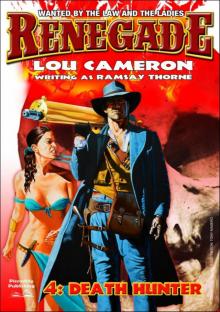 The Death Hunter
The Death Hunter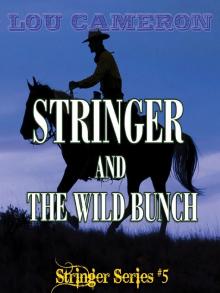 Stringer and the Wild Bunch
Stringer and the Wild Bunch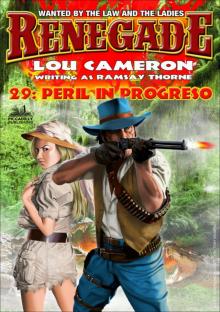 Renegade 29
Renegade 29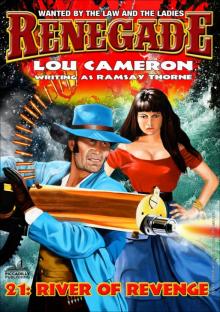 Renegade 21
Renegade 21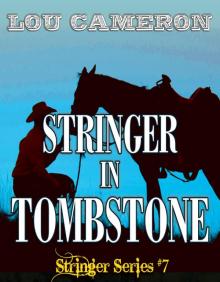 Stringer in Tombstone
Stringer in Tombstone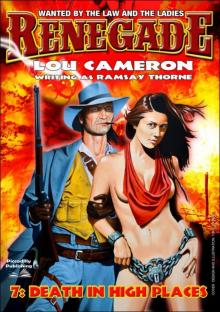 Death in High Places (A Renegade Western Book 7)
Death in High Places (A Renegade Western Book 7)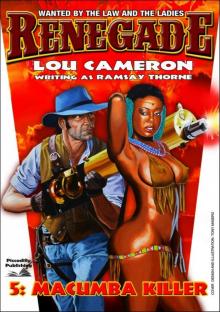 Macumba Killer
Macumba Killer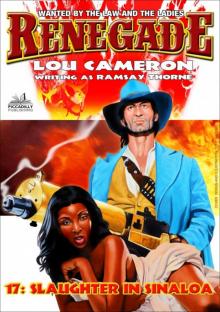 Renegade 17
Renegade 17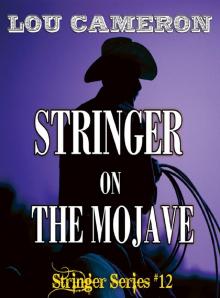 Stringer on the Mojave
Stringer on the Mojave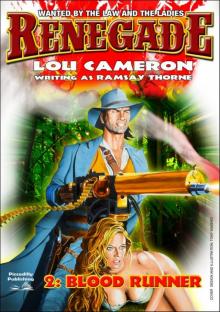 Blood Runner
Blood Runner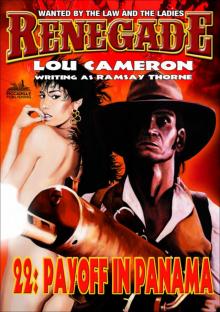 Renegade 22
Renegade 22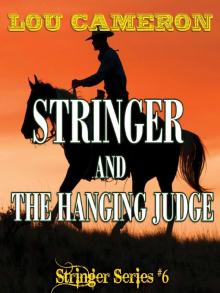 Stringer and the Hanging Judge
Stringer and the Hanging Judge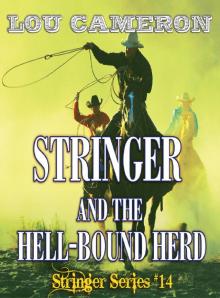 Stringer and the Hell-Bound Herd
Stringer and the Hell-Bound Herd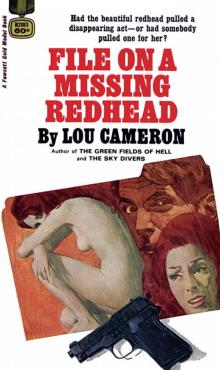 File on a Missing Redhead
File on a Missing Redhead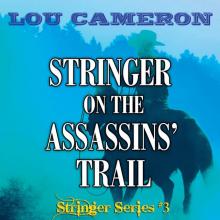 Stringer on the Assassins' Trail
Stringer on the Assassins' Trail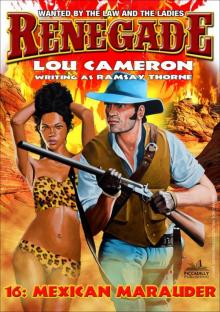 Mexican Marauder (A Captain Gringo Adventure #16)
Mexican Marauder (A Captain Gringo Adventure #16)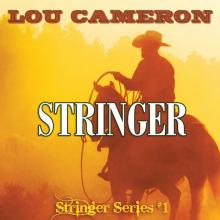 Stringer
Stringer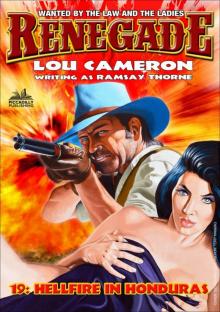 Renegade 19
Renegade 19 Stringer and the Oil Well Indians
Stringer and the Oil Well Indians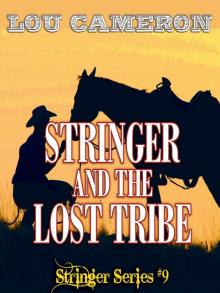 Stringer and the Lost Tribe
Stringer and the Lost Tribe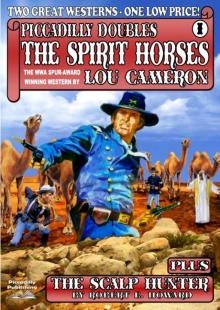 Piccadilly Doubles 1
Piccadilly Doubles 1 Stringer and the Border War
Stringer and the Border War Renegade
Renegade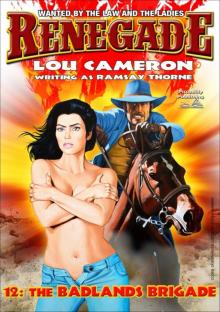 The Badlands Brigade (A Captain Gringo Adventure Book 12)
The Badlands Brigade (A Captain Gringo Adventure Book 12)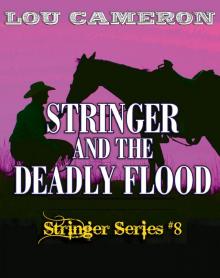 Stringer and the Deadly Flood
Stringer and the Deadly Flood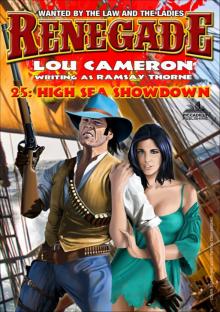 Renegade 25
Renegade 25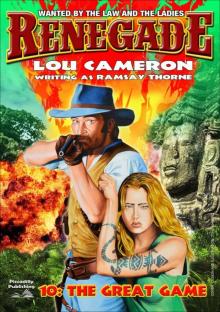 The Great Game (A Captain Gringo Western Book 10)
The Great Game (A Captain Gringo Western Book 10)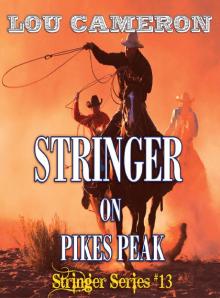 Stringer on Pikes Peak
Stringer on Pikes Peak